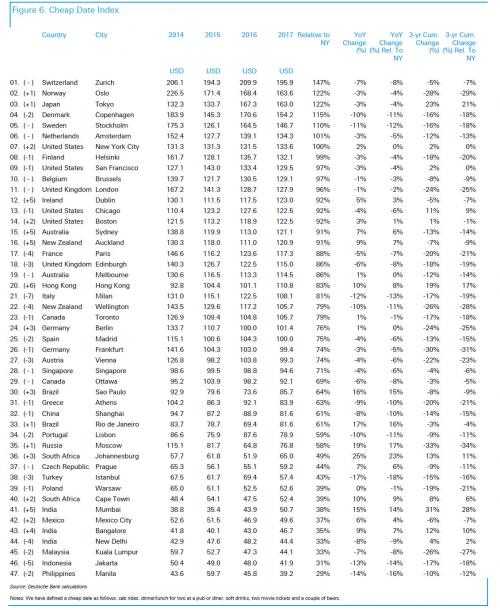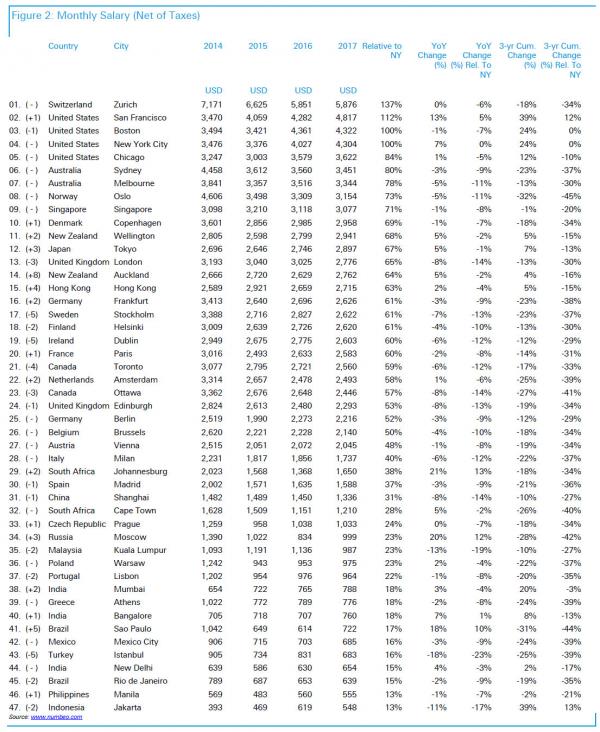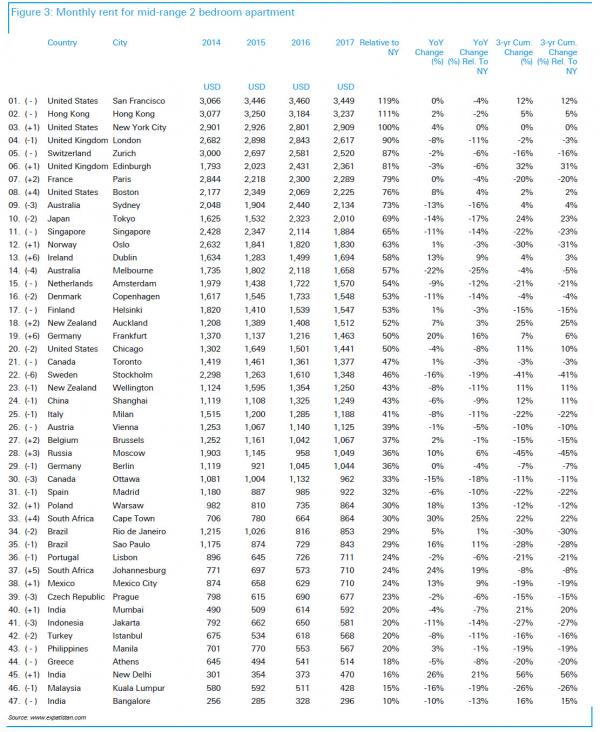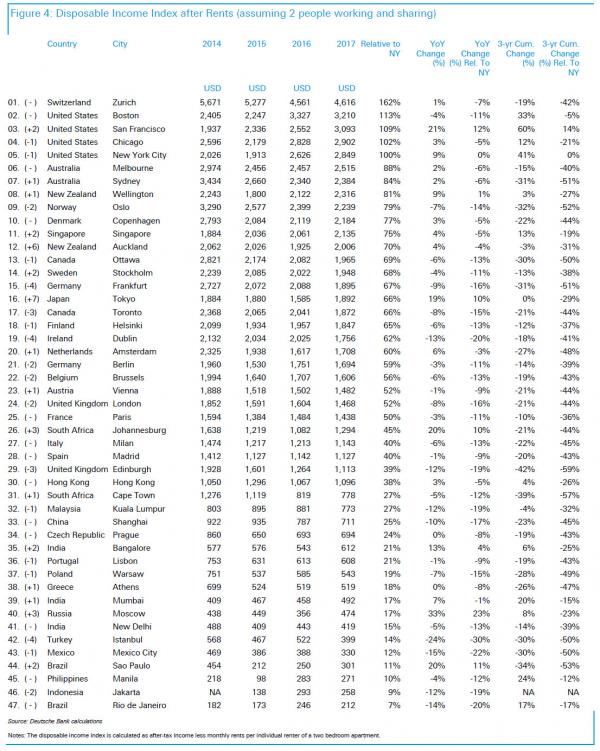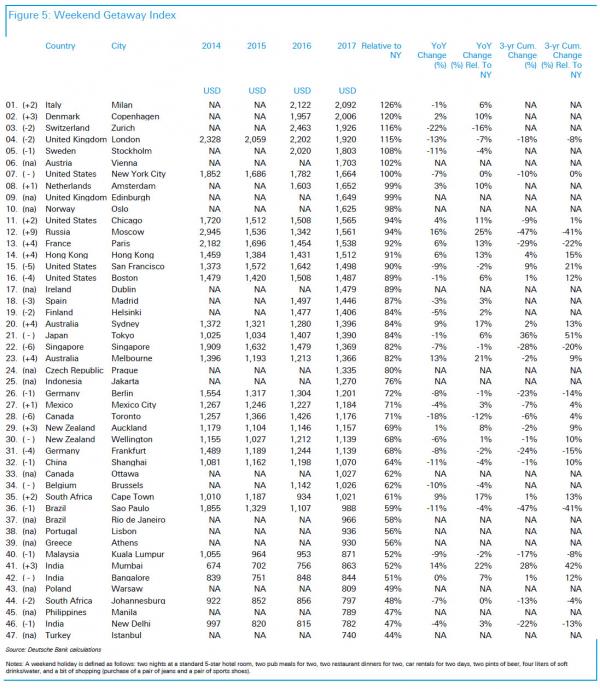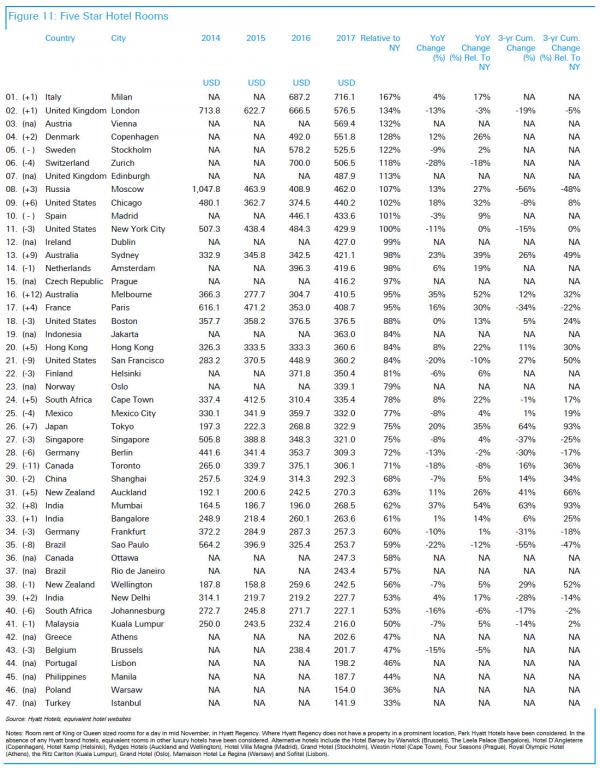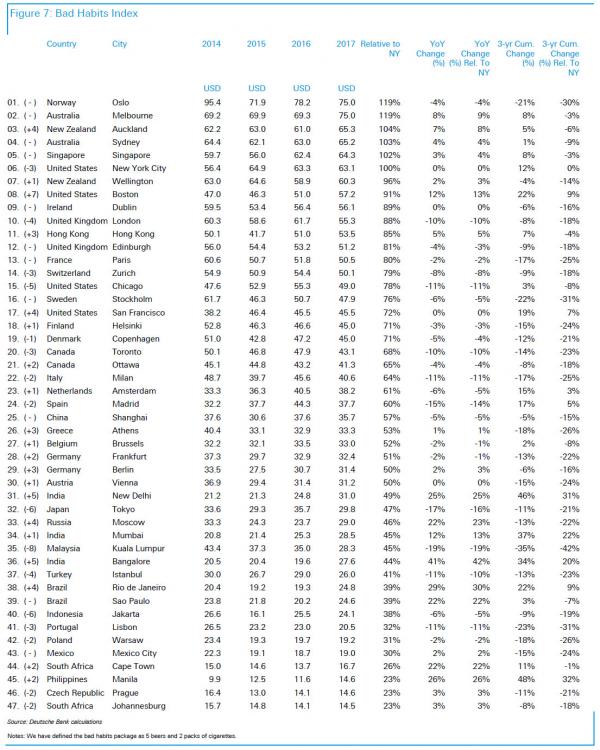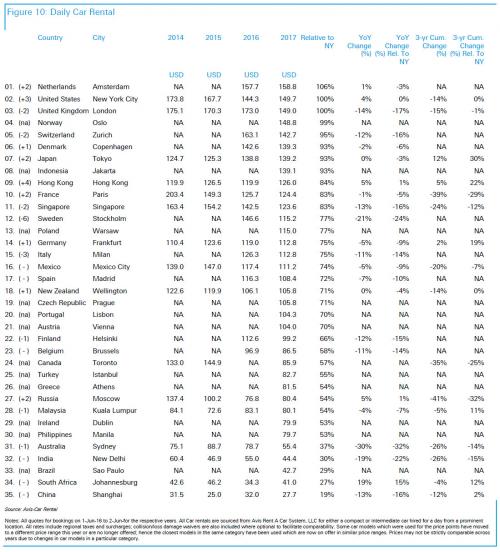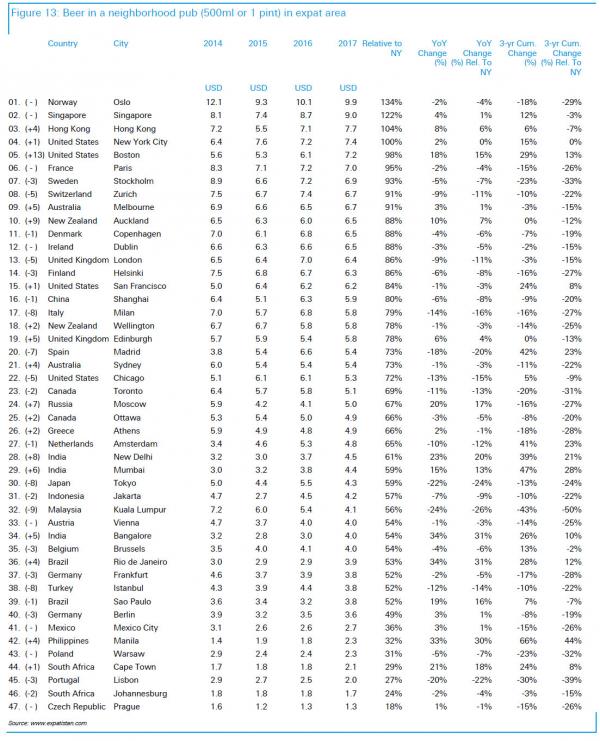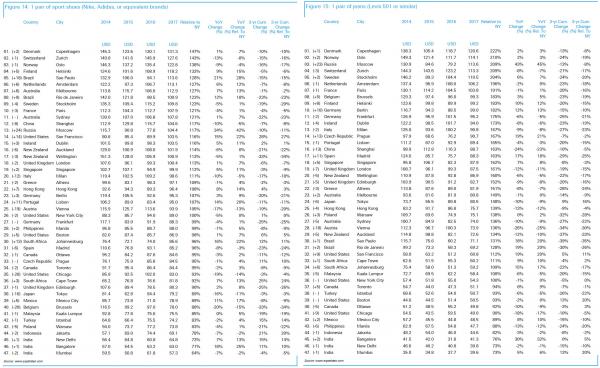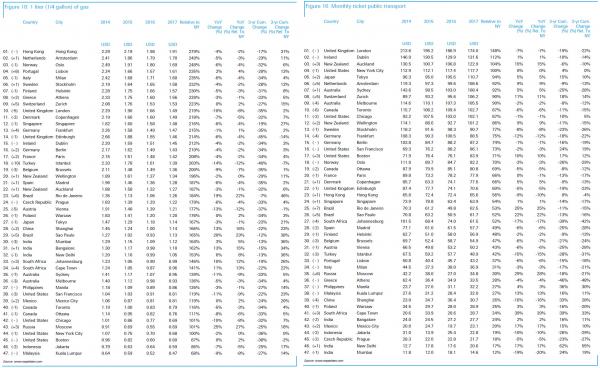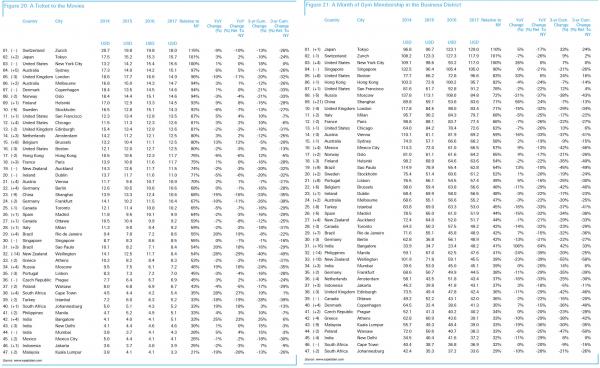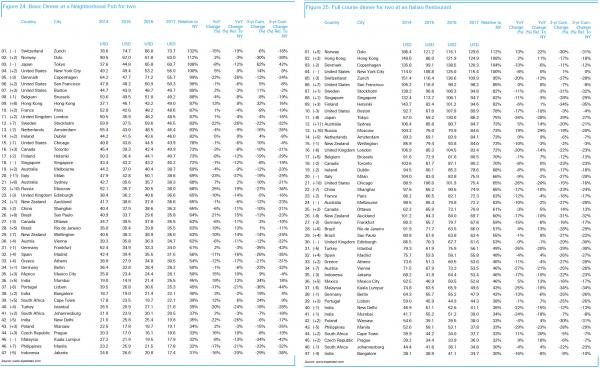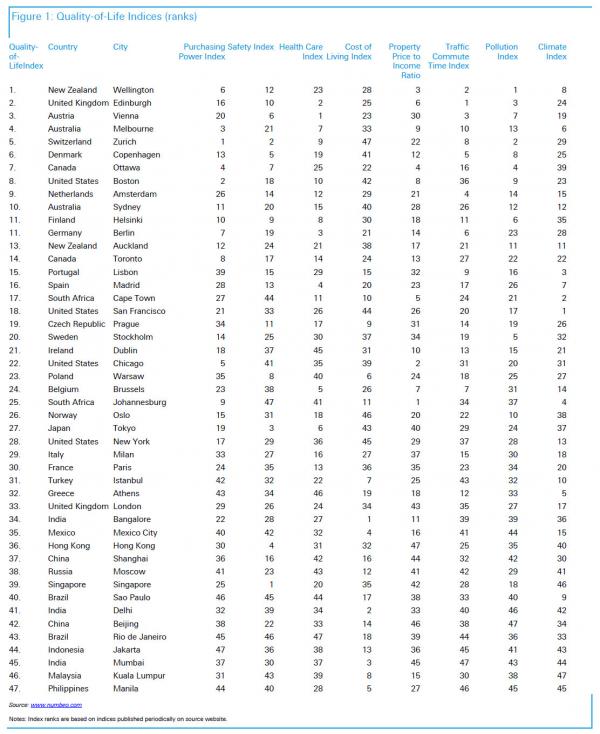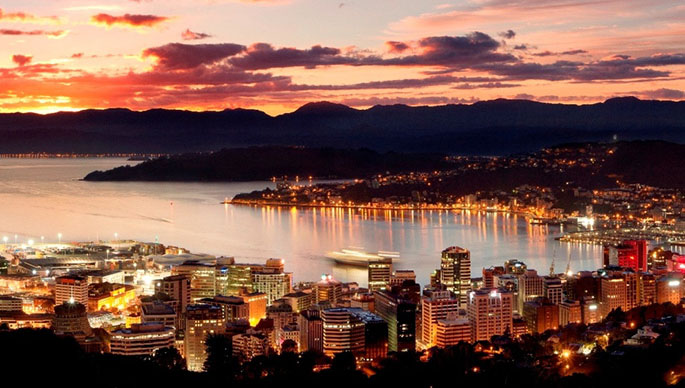Every year Deutsche Bank releases its fascinating index of real-time prices around the world which looks at the cost of goods and services from a purchase-price parity basis, to determine the most expensive - and in this year's edition, best - cities. As have done on several occasions in the past, we traditionally focus on one specific subindex: the cost of "cheap dates" in the world's top cities. The index consists of i) cab rides, ii) dinner/lunch for two at a pub or diner, iii) soft drinks, iv) two movie tickets and a v) couple of beers. Deutsche Bank's advice to those in Zurich is either to marry young or choose your blind dates carefully as its "cheap date" index continues to see Zurich as the most expensive place for courtship. Tokyo climbs to second and Oslo, Copenhagen and Stockholm make up the top 5. Indeed these 5 cities are also the most expensive for a haircut so the pre-date investment costs are also high! If you're in the Philippines, Indonesia, Malaysia, India and Mexico a date is around a quarter of the cost of that in Zurich and a haircut about a tenth of the price. So if you're young, free and single in Zurich, depending on how much you date it might be profitable to migrate to parts of Asia even after the salary sacrifice, the German bank suggests.
Topics:
Tyler Durden considers the following as important: Apple, Australia, Brazil, Copenhagen, Cost of living, Czech, Deutsche Bank, economic growth, economy, ETC, Geography of Europe, Greece, Hong Kong, Index, India, Japan, Jim Reid, Mexico, Oslo, purchasing power, Turkey, Zurich
This could be interesting, too:
investrends.ch writes Bloomberg: DWS stoppt Private-Credit-Geschäft in Asien
investrends.ch writes Deutsche Bank bleibt auf Rekordkurs
investrends.ch writes US-Gericht: Google muss Chrome und Android nicht verkaufen
investrends.ch writes DWS mit neuem Vertriebsleiter für Institutionelle
Every year Deutsche Bank releases its fascinating index of real-time prices around the world which looks at the cost of goods and services from a purchase-price parity basis, to determine the most expensive - and in this year's edition, best - cities. As have done on several occasions in the past, we traditionally focus on one specific subindex: the cost of "cheap dates" in the world's top cities.
The index consists of i) cab rides, ii) dinner/lunch for two at a pub or diner, iii) soft drinks, iv) two movie tickets and a v) couple of beers. Deutsche Bank's advice to those in Zurich is either to marry young or choose your blind dates carefully as its "cheap date" index continues to see Zurich as the most expensive place for courtship. Tokyo climbs to second and Oslo, Copenhagen and Stockholm make up the top 5. Indeed these 5 cities are also the most expensive for a haircut so the pre-date investment costs are also high!
If you're in the Philippines, Indonesia, Malaysia, India and Mexico a date is around a quarter of the cost of that in Zurich and a haircut about a tenth of the price. So if you're young, free and single in Zurich, depending on how much you date it might be profitable to migrate to parts of Asia even after the salary sacrifice, the German bank suggests.
And while traditionally we end it here, focusing merely on the most (and least) expensive cities part of the study, this year it is worth expanding because what started off as a pet project for Jim Reid back in 2011 has turned into a purchase-price parity masterpiece, as well as a crowdsourced "quality of life" index, which ranks some 50 of the world's top cities on par with any of the rankings seen in various other, more popular rankings such as that by Mercer. As the London-based banker writes, "We continue to add new cities, refine our methodology and while it’s impossible to exactly match products and services around the world we try to ensure as much uniformity as possible and then convert prices back to USD."
Some further details:
This year Deutsche has added a few new series. In particular average after-tax salaries, average 2-bed apartment rental costs and finally a quality-of-life index that is the most subjective measure in the report and will probably cause most arguments, debates and disagreements. A lot of the data in the report is crowdsourced (including this new quality-of-life index). Wellington, NZ comes out on top out of the 47 cities we cover based on purchasing power, crime, healthcare, cost of living, house prices, commuting time, pollution and climate. Edinburgh, Vienna, Melbourne, Zurich and Copenhagen are next. Of our 47 cities, the 'mega cities' like Tokyo (rank 27), NYC (28), Paris (30), London (33), Shanghai (37) and Mumbai (45) rank very low mostly due to high living costs, crime, pollution and commuting time. Megacity dwellers may also forsake short-term quality of life for aspirational reasons with these cities providing more upside rewards from the average for those most successful.
Looking simply at most expensive cities, Reid finds that Zurich remains the most expensive place to do and buy a lot of things but does have the highest average salaries, followed by several US cities and then Sydney. London has slipped out of the top 10 post the Brexit-FX fall.
Rents are highest in San Fran, HK, NYC, London and then Zurich. Of note: the difference for a 2 bedroom rental between the most expensive city, San Francisco, and India's Bangalore, when indexed in USD is a whopping 12 times.
Zurich is home to the highest ‘disposable income after rents’ and at the top of the purchasing power index.
However it might depend on how many dates and haircuts you have in a month (see top chart) as to how wealthy you feel. At the other end of the scale if you're in Jakarta, Manila, Rio, New Delhi and Istanbul and a job comes up in Zurich then you could potentially increase your salary by ten-fold. Mind the cost of living increases though.
Global brands continue to be relatively cheaper in the US than across its DM peers. The top 10 most expensive regions across goods and services remain dominated by European cities. Swiss and Nordic/Scandinavian cities in particular require a tolerant bank manager to enable consumption. If you find yourself on holiday in Turkey, Brazil, Russia or Greece try to avoid the Apple store as iPhones are 25-50% more expensive than in the US - still the cheapest place to buy. Japan, Hong Kong, Malaysia and Canada only see a small premium over US prices.
The "weekend getaway" index reflects the general cost of living around the world but is perhaps biased by hotel costs.
Milan is the new number-one (very expensive hotels), followed by Copenhagen, Zurich, London, Stockholm, Vienna and NYC. Much lower hotel costs in Asia continue to keep these cities as attractive holiday destinations.
The 'bad habits' index of cigarettes and beers is most costly in Australia, NZ and Singapore. At the opposite end of the spectrum it’s very cheap to indulge in such habits in the Czech Republic and South Africa.
If you relocate to Singapore, Copenhagen or Oslo consider a bike rather than a new car as duties etc. make the cost very prohibitive.
Avoid car rentals in Amsterdam and try not to get thirsty in Oslo (beer or coke)...
... and refrain from buying jeans and trainers in Copenhagen.
Petrol costs most in HK and public transport most in London.
Zurich also tops the rankings for most expensive movie tickets, while those who want to stay in shape will spend the most in Tokyo (with Zurich 2nd).
Hungry? A basic dinner will set up back some $73.70 in Zurich, while a full course dinner for two is most expensive in Oslo and costs just about $130.
Finally, new to this year’s study is a quality-of-life index of the 47 major cities DB collected prices for across the rest of this document. Figure 1 shows the overall index level plus the ranks for the individual components. The data has been collected by www.numbeo.com - a large crowd-sourced information database on global prices, quality of living etc. The data is based on the following 8 variables; purchasing power, safety, healthcare, cost of living, house prices/income, commuting time, pollution and climate.

